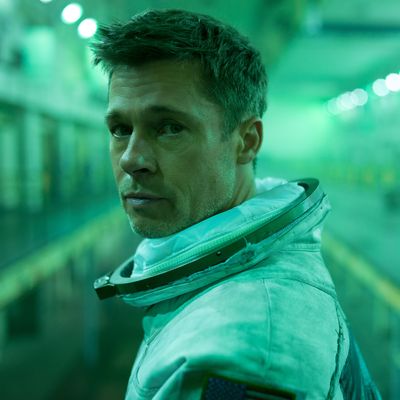
James Gray’s space opera Ad Astra is so eerily, transfixingly beautiful that I want to purge from my mind its resolution, which reduces what precedes it to a Shaggy Dad story — an especially earthbound one. In outline, the film is a Kubrick-like retelling of Apocalypse Now in which the Willard character, Roy McBride (Brad Pitt), is the son of the renegade Kurtz figure, H. Clifford McBride (Tommy Lee Jones), whose ship disappeared many years ago (this is the “near future”) in the vicinity of Neptune while searching for signs of distant life. In recent months, McBride Sr. might be responsible (no one can reach him to find out) for anti-matter pulses that threaten the entire solar system; so military brass has put together a top-secret mission to send Roy to Mars to, well, basically phone Dad, the reception being better that far from Earth. Getting to Mars is no cakewalk, mind you. Roy contends not just with the usual shuttle-docking screwups but pirates, mad apes, and other stuff you don’t expect to see off terra firma. It’s a jungle up there.
Roy is a great role for Pitt, who narrates throughout in a measured, groggy voice reminiscent of Martin Sheen’s Willard and whose lack of modulation can thereby pass for existential woe. Roy is required to take a daily “psych eval,” through which we learn that he has pushed his emotions so deep that nothing ever gets to him. His pulse remains at 80, even when in free fall miles above the planet. “I’ve been trained to compartmentalize,” he tells us, blandly, but it’s more than that, of course. He’s always running from others — including his wife (Liv Tyler), seen in flashbacks — along with his own feelings. It’s open to speculation whether his distance from humanity (which he professes to hate) can be attributed to a dad whose eyes were on the stars even at home and left for good when Roy was 12. But you don’t need to speculate too long.
The movie is filled with exciting cliffhangers (I’ve never seen a zero-gravity knife fight before, with the fighters in space suits) and a few supporting actors register — chiefly Ruth Negga, Loren Dean, and (too briefly) a sepulchral Donald Sutherland. But it’s mostly Pitt and nothing but. Gray, even more successfully than in Two Lovers and The Lost City of Z, steeps you in his protagonist’s psyche. It’s as if we’re in some sort of hyperbaric chamber, with oxygen meted out gradually to keep us absorbed even when our fight-or-flight instincts tell us to panic — our pulses remain at 80. Apart from a few spasmodic jolts, the editing (by John Axelrad and Lee Haugen) is fluid, while the colors (the production designer is Kevin Thompson) hum on tranquil frequencies. The sound design is stunning. The composer Max Richter’s usual ambient wash is cut with ethereal harps and plinks from the piano’s highest keys, while sudden silences reverberate with dread. The cinematographer Hoyte van Hoytema’s frames are spare, evoking the vast distance between souls. The effect is to make you understand the pressure not to feel — and hence to experience, with Roy, a fierce longing for the material world.
That’s the point of all this: Space is a drag, and going in search of extraterrestrial life requires denying or desensitizing oneself to terrestrial life, to the natural, the human. Only when out of his own world does Roy understand how selfishly he has lived and how much he needs to reconnect with his father to understand himself — at which point his pulse, doncha know, shoots up.
(Light spoilers for Ad Astra below.)
I could hardly agree more with the humanist message of Ad Astra, while at the same time my inner Trekkie is saying, “We came millions of miles for this?” When we meet McBride Sr. it’s an anticlimax, even with Jones so eloquently haggard, like an elderly, shrunken lion. He’s primed to give a performance but McBride’s madness — unlike Kurtz’s — gives him no stature. In the end, Roy could probably have clicked his heels together at any time and gone back to Kansas. I’m glad he didn’t, though, because we’d have missed so many thrilling blastoffs and tumbles through space and a vibe that chills you out while making you grieve the absence of connection. I almost wish that resolutions were superfluous, that in our imaginations we could be forever suspended with Roy in the gorgeous void of space.





